Overview
Digital transformation in healthcare presents a compelling opportunity. It offers substantial benefits, such as:
- Improved operational efficiency
- Enhanced patient engagement
- Superior health outcomes
All achieved through the integration of technologies like telemedicine and predictive analytics. These digital tools not only streamline workflows but also reduce costs and facilitate personalized care. As a result, we see a more responsive healthcare system that adeptly meets the evolving needs of patients. Are you ready to embrace these advancements and transform your healthcare experience?
Introduction
In the rapidly evolving landscape of healthcare, digital transformation stands as a pivotal force reshaping the delivery and experience of care. By integrating advanced technologies such as artificial intelligence, telemedicine, and electronic health records, healthcare organizations are not only optimizing operations but also enhancing patient engagement and outcomes.
However, as the industry grapples with challenges like data security and staff resistance, the commitment to a digital future becomes increasingly critical. This article delves into the multifaceted dimensions of digital transformation in healthcare, exploring its benefits, challenges, and the innovative solutions that are paving the way for a more efficient and patient-centered system.
What does this mean for healthcare providers? It signifies an urgent need to embrace change and leverage technology to improve care delivery and patient satisfaction.
Understanding Digital Transformation in Healthcare
Digital transformation in healthcare represents a significant integration of digital technologies, data analytics, and innovative processes across all operational facets, clearly demonstrating the advantages of this evolution. The primary objective of this transformation is to elevate individual care, streamline workflows, and ultimately enhance health outcomes by leveraging the benefits inherent in digital advancements. Key technologies, such as electronic health records (EHR), telemedicine, and artificial intelligence (AI), exemplify how digital transformation empowers providers to deliver more efficient and personalized care.
The shift towards electronic solutions transcends mere technology acceptance; it necessitates a cultural transformation within organizations that fosters innovation and enhances client engagement. A recent study highlights this optimism, revealing that 71% of medical students believe digital health will positively reshape medical services globally.
By 2025, predictive analytics will increasingly shape the medical services landscape, utilizing historical and real-time data to anticipate individual needs. This capability not only improves outcomes for individuals but also optimizes resource allocation within medical systems. Avato plays a pivotal role in this context, offering a dedicated hybrid integration platform that enables healthcare organizations to effectively harness predictive analytics.
As health systems face mounting pressure to enhance efficiencies and client engagement, investing in technological tools and alternative care delivery options has become imperative. Many individuals are gravitating towards accessible medical solutions, such as virtual care and retail services, which meet evolving consumer expectations.
Moreover, the adoption of electronic technologies addresses critical operational challenges, such as lengthy wait times that frustrate both individuals and staff. By automating and refining workflows, medical organizations can significantly improve the patient experience. Successful examples of technological transformation underscore the benefits of digital advancements in healthcare, illustrating how health systems can leverage technology to foster patient loyalty and address health disparities through improved access to care and education.
As customer Gustavo Estrada remarked, “Avato simplifies complex projects and delivers results within desired time frames and budget constraints,” emphasizing the platform’s effectiveness in overcoming these challenges.
Expert insights stress that the future of medical services depends on the successful implementation of digital technologies. As organizations navigate this transformation, they must prioritize strategies that not only enhance operational capabilities but also ensure that patient care remains central to their initiatives.
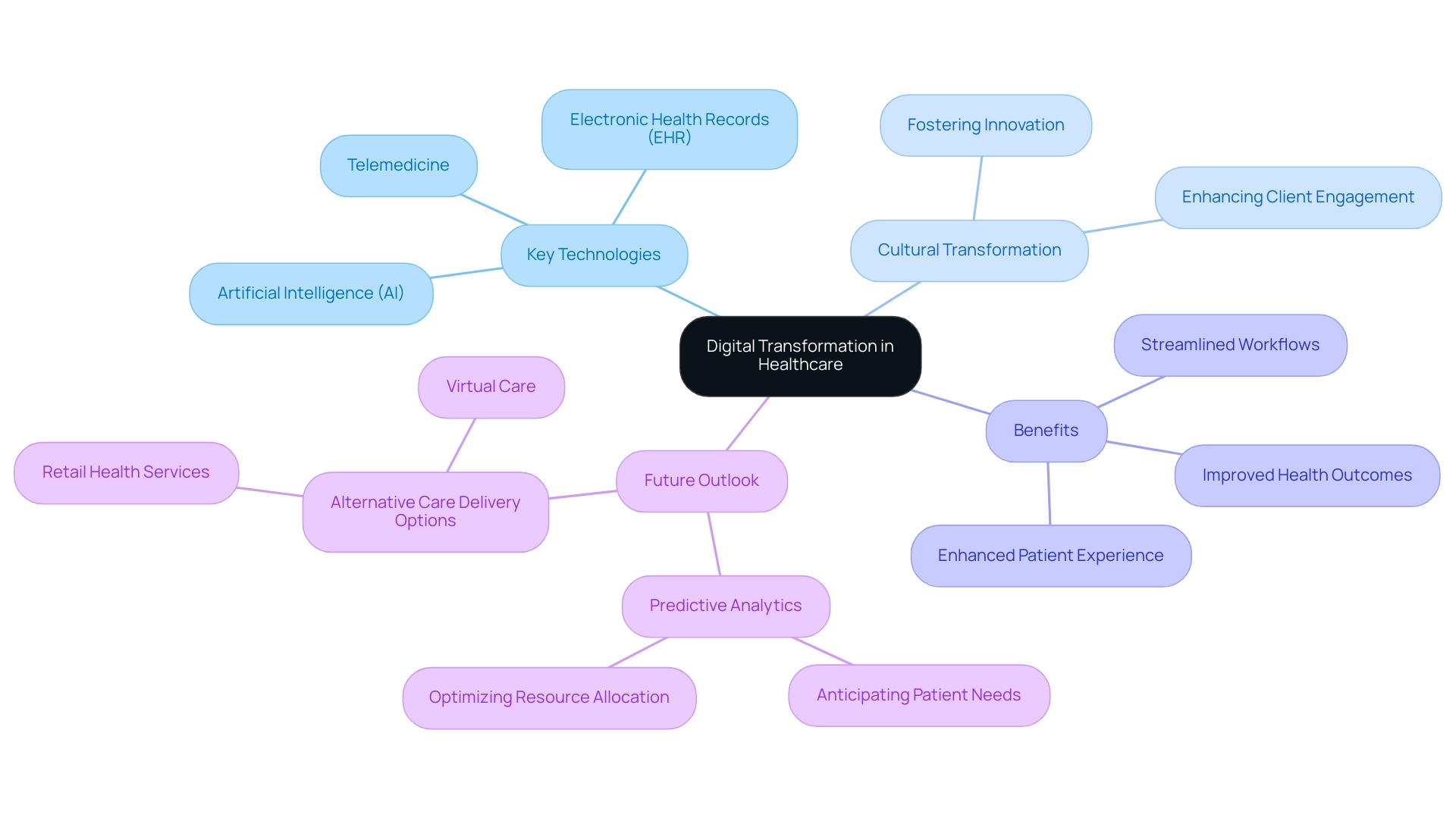
Key Benefits of Digital Transformation in Healthcare
The benefits of digital transformation in healthcare present numerous advantages that significantly enhance operational efficiency, client involvement, and overall health outcomes. By automating administrative tasks and streamlining workflows, medical providers can realize substantial cost reductions and minimize errors. For instance, telemedicine has revolutionized access to healthcare, facilitating remote consultations that save time and extend care to underserved populations.
In 2025, statistics indicate that telemedicine has improved access for individuals by over 30%, underscoring its vital role in contemporary medical service delivery. As researcher Wootton R. notes, “Telemedicine applications have achieved different levels of success,” which emphasizes the varying impacts of these technologies.
Furthermore, the integration of analytics empowers healthcare organizations to derive valuable insights into patient populations. This capability fosters the development of personalized treatment plans, leading to improved health outcomes. A recent case study titled “Strategies for Implementing Digital Technologies in Health Systems” highlights that modernizing data infrastructure and strengthening cybersecurity measures are essential steps for effectively integrating emerging technologies.
These strategies not only enhance efficiencies but also address the inherent risks associated with digital transformation.
Avato’s Hybrid Integration Platform plays a pivotal role in this transformation by simplifying complex integrations and providing cost-effective solutions. By connecting legacy systems with contemporary applications, Avato enables healthcare providers to create a connected foundation that enhances care for individuals and operational efficiency. As Tony Leblanc from the Provincial Health Services Authority stated, “Avato accelerates the integration of isolated systems and fragmented data, delivering the connected foundation enterprises need to simplify, standardize, and modernize.”
Despite challenges such as clinical staff shortages and budget constraints, health system leaders remain optimistic about leveraging technological solutions to reduce expenses and improve experiences for individuals. Expert insights reveal that systemic changes in medical finances, staff education, and infrastructure are crucial for successful technological innovation. As medical services continue to evolve, the benefits of digital transformation in healthcare, supported by Avato’s integration capabilities, will be instrumental in fostering a more responsive and effective medical system, ultimately leading to enhanced care and outcomes.
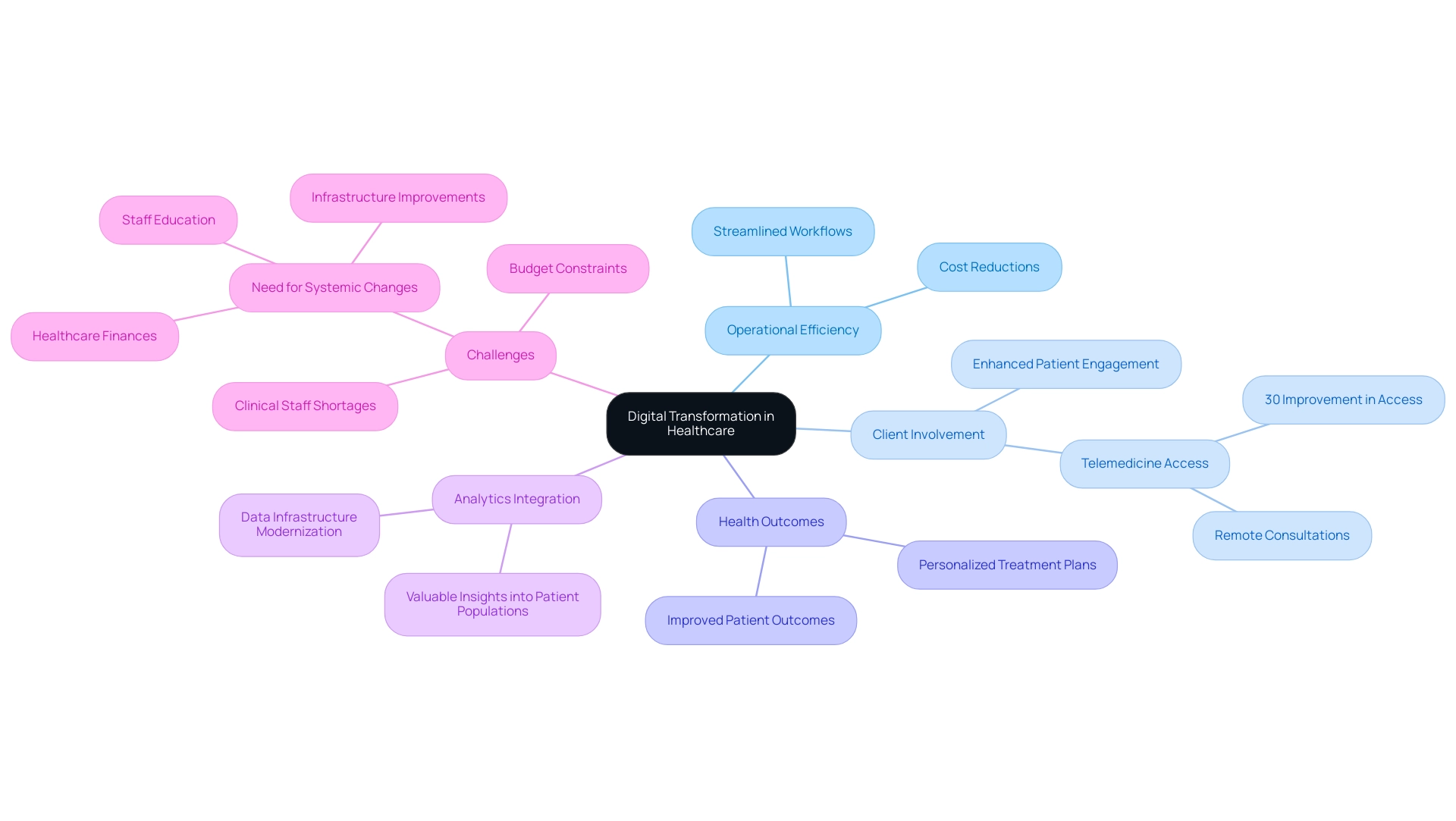
Enhancing Patient Care and Experience Through Digital Solutions
Digital solutions are essential in enhancing care and experience, showcasing the transformative benefits of digital innovation in healthcare through technologies such as portals and the groundbreaking applications of AI and VR. These platforms empower individuals to access their medical records, schedule appointments, and communicate with medical providers effortlessly. Telehealth services have revolutionized care, particularly during the COVID-19 pandemic, by facilitating timely access to healthcare professionals without the necessity for in-person visits.
This shift not only boosts client satisfaction but also empowers individuals to take an active role in managing their health, which correlates with better adherence to treatment plans and improved health outcomes.
The impact of telehealth on client satisfaction is substantial, with studies indicating that individuals who utilize these services report higher levels of engagement and satisfaction. For instance, a recent survey revealed that 78% of individuals expressed satisfaction with their telehealth experiences, underscoring the effectiveness of these digital solutions in meeting needs. Furthermore, access portals have been shown to enhance the medical experience by providing easy access to information and fostering communication, which is crucial for nurturing a collaborative relationship between individuals and providers.
Case studies illustrate the positive outcomes associated with access portals. In one instance, a healthcare organization implemented a portal for individuals that resulted in a 30% increase in engagement and a notable improvement in health outcomes. This exemplifies the potential benefits of digital transformation in healthcare, which can not only streamline processes but also elevate the overall quality of care.
Moreover, the integration of AI and VR technologies is playing a pivotal role in humanizing care. For example, virtual reality has been utilized to alleviate pain during medical procedures, demonstrating its capacity to enhance experiences for individuals. Notably, technologies like SimCoach, which employs a virtual avatar to support veterans with PTSD, and the AI avatar Nadia, which assists elderly individuals in understanding their treatment options, exemplify the innovative applications of AI in healthcare.
Expert opinions underscore the advantages of digital transformation in healthcare, particularly the role of telehealth in reshaping individual experiences. As noted by industry leaders, the integration of telehealth services has become a top priority for health systems aiming to drive efficiencies and improve patient care. Additionally, with 46% of health system executives anticipating a moderate impact from climate change on their organizations this year, the urgency for sustainable and efficient medical solutions is more pronounced than ever.
The continuous development of electronic wellness solutions, including the emergence of wearable devices, is paving the way for a more responsive and patient-centered medical landscape. As Mini Särkkä-Hietala, a partner in Health & Human Services, emphasizes, collaboration with public sector health and human services actors is essential in this transformation. Furthermore, an open-data future where individuals are in charge of their own data is crucial for realizing the full potential of these digital advancements.
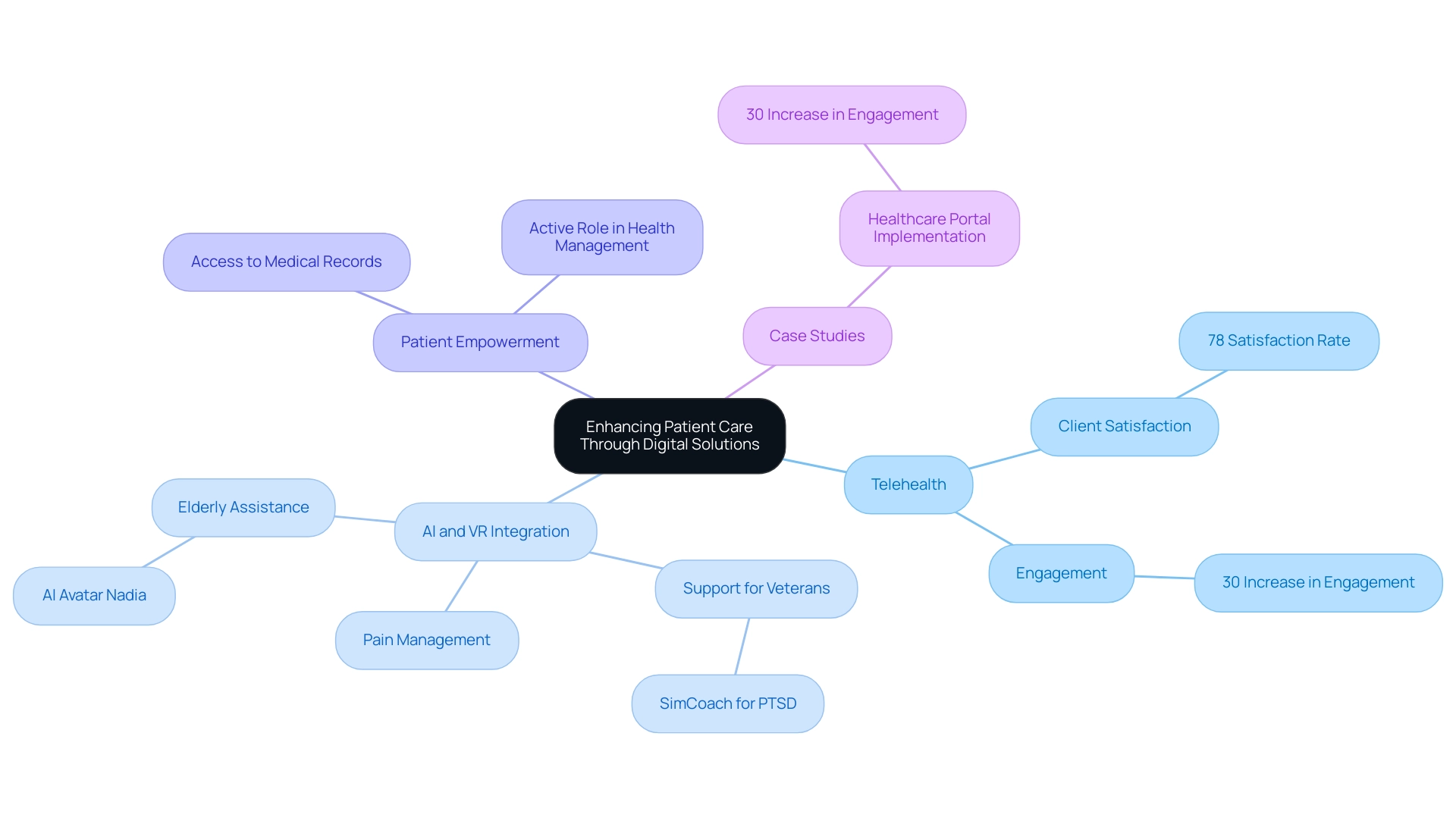
Improving Access to Healthcare Services with Digital Tools
The benefits of digital transformation in healthcare are unmistakable, as digital tools revolutionize access to medical services, particularly for populations in remote or underserved areas. Telemedicine platforms empower individuals to consult with medical professionals from the comfort of their homes, effectively dismantling geographical barriers and significantly reducing travel time. This shift not only enhances convenience for individuals but also ensures timely access to necessary care, which is crucial for improving health outcomes.
As we approach 2025, the rise of telemedicine is evident, with statistics indicating a substantial increase in usage among remote populations. For instance, remote monitoring technologies are becoming increasingly prevalent, allowing medical professionals to track individuals’ health metrics in real-time. This capability facilitates prompt interventions, essential for managing chronic conditions and preventing complications.
The impact of these technologies extends beyond individual patient care, as they contribute to a reduction in hospital readmissions. By enabling continuous monitoring and proactive management of health issues, remote monitoring significantly lowers readmission rates and alleviates pressure on healthcare systems.
However, as reliance on digital tools grows, so does the importance of cybersecurity. In 2024, the United States faced 550 healthcare-related breaches impacting 166 million individuals, underscoring the urgent need for enhanced cybersecurity strategies to safeguard medical information and comply with regulatory standards. This is particularly significant for banking IT managers who understand the critical importance of security in the medical field.
Avato’s hybrid integration platform plays a vital role in addressing these concerns by providing secure and efficient data integration solutions that protect patient information.
Case studies illustrate the benefits of digital transformation in healthcare by demonstrating the effectiveness of telemedicine in improving access to medical services. For example, hospitals are increasingly adopting decentralized medical models, which are particularly appealing to younger professionals who prioritize flexibility. This trend has resulted in a broader array of services being offered in various locations or entirely remotely, further bridging the gap for underserved populations.
As Gustavo Estrada noted, “Avatar has the ability to simplify complex projects and deliver results within desired time frames and budget constraints,” emphasizing the role of Avato’s dedicated hybrid integration platform in supporting these technological transformations. By unlocking isolated assets and facilitating business value generation, Avato is paving the way for enhanced medical delivery through technology, AI, and VR solutions.
Moreover, Avato’s solutions improve patient access to their medical information, empowering individuals to take charge of their wellness experiences. As electronic tools continue to evolve, the benefits of digital transformation in healthcare will increasingly enhance access to medical services, making them essential in the pursuit of equitable medical delivery.
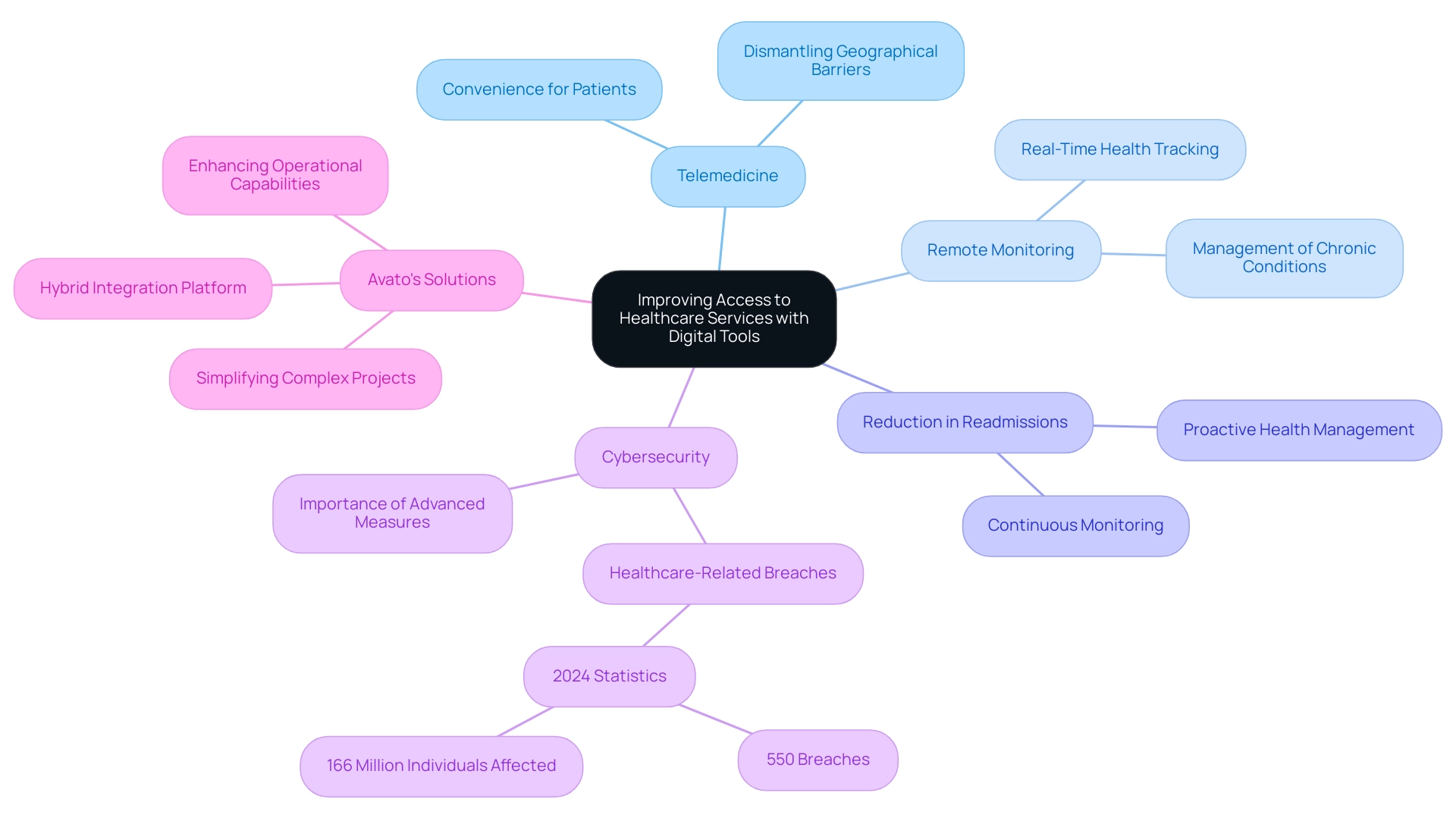
Ensuring Data Security and Privacy in Digital Healthcare
Guaranteeing information protection and confidentiality is essential in the technological evolution of medical services. As medical organizations increasingly depend on digital technologies, the implementation of strong cybersecurity measures becomes crucial to safeguard sensitive information from breaches and unauthorized access. Adherence to regulations like HIPAA is not merely a legal requirement; it is a vital element in preserving trust and ensuring information integrity.
In 2025, compliance rates with HIPAA in medical organizations will be closely observed, with an emphasis on improving patient information protection. Strategies such as:
- Encryption
- Regular security audits
- Comprehensive employee training on protection practices
are vital components of a robust security framework. The increasing expenses of cybercrime, projected to hit $10.5 trillion yearly by 2025, emphasize the urgency for medical providers to adopt advanced technologies and proactive cybersecurity strategies, as highlighted in recent cybersecurity trends.
Current statistics reveal a staggering 278% increase in ransomware attacks reported between January 1, 2018, and September 30, 2023, underscoring the escalating threat landscape. Steve Alder observes that ‘hacking is now the leading cause of medical information breaches,’ highlighting the essential requirement for improved security measures. Moreover, the average cost of a breach for higher education institutions stands at approximately $3.65 million, illustrating the financial implications of inadequate security measures.
This figure serves as a warning for medical professionals, who must acknowledge the potential expenses of failing to protect client information. By emphasizing information protection, medical service providers can create a secure environment that underscores the benefits of digital transformation in healthcare for individuals interacting with electronic health solutions. This commitment not only safeguards patient information but also demonstrates the advantages of digital transformation in healthcare, improving the overall effectiveness of transformation initiatives and ensuring that organizations can navigate the complexities of modern technology while maintaining compliance and trust. Furthermore, leveraging Avato’s hybrid integration platform, which includes robust analytics capabilities for continuous monitoring and optimization, can significantly bolster these efforts.
Avato’s services, including enterprise architecture, project management, and technical analysis, provide comprehensive support for organizations in implementing these strategies. This technology enables organizations to adjust to evolving demands, manage risks effectively, and ensure adherence to regulatory standards, ultimately supporting a secure and efficient transformation.
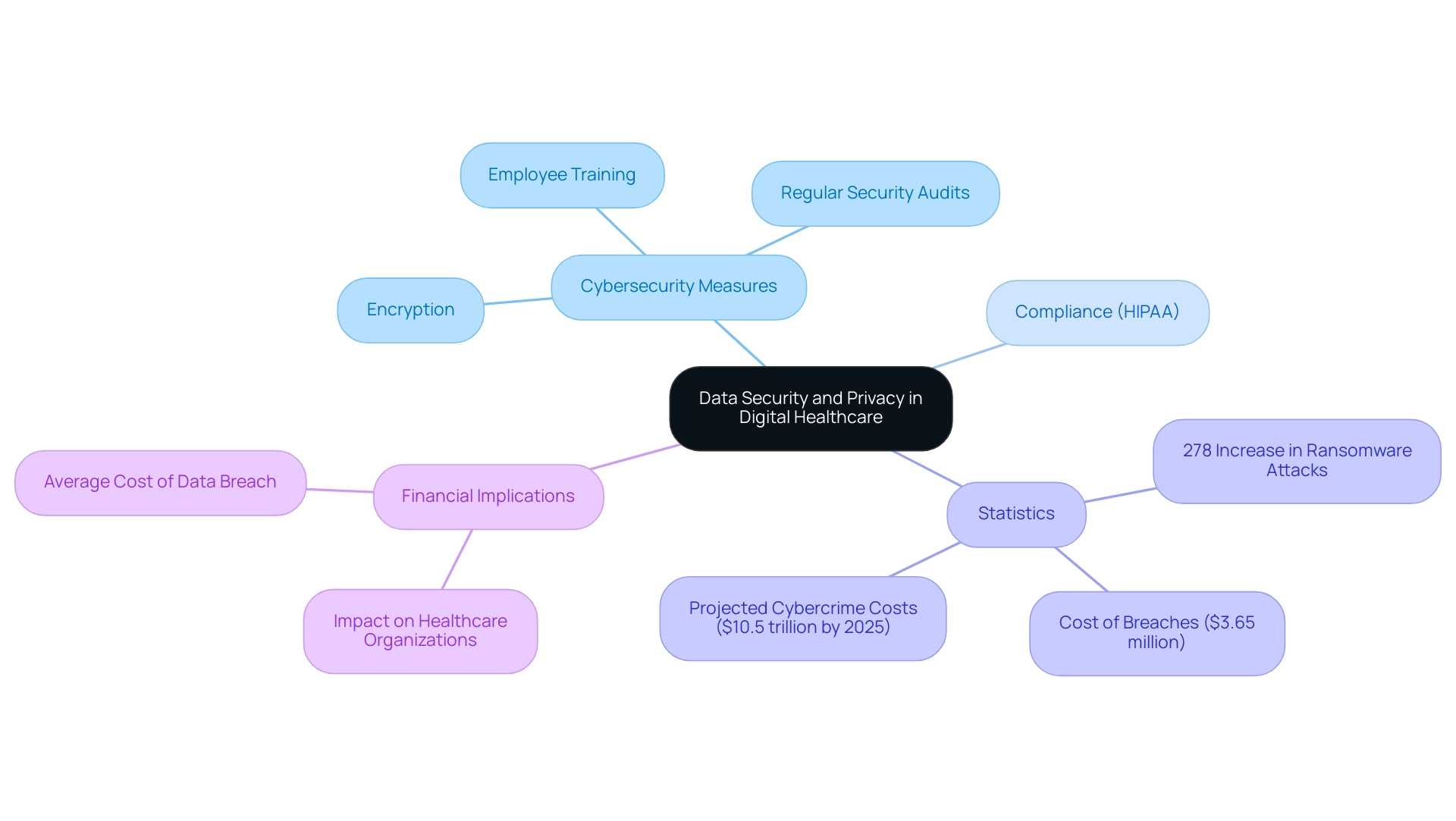
Challenges and Considerations in Digital Transformation
Digital transformation in the medical field presents a multitude of advantages, yet it also encounters significant challenges. A prominent obstacle is the resistance to change among medical staff. Recent studies reveal that approximately 30% of medical employees are reluctant to embrace new digital solutions by 2025. This statistic emerges from research analyzing 287 articles categorized by context, underscoring the pervasive nature of this resistance.
Concerns regarding job security and the usability of new technologies frequently fuel this hesitance, highlighting the urgent need for effective change management strategies.
High implementation costs further complicate the transition, as organizations are required to invest not only in technology but also in training and support systems to ensure successful adoption. Interoperability issues between disparate systems can lead to fragmented information and hinder seamless communication. Thus, it becomes essential for organizations to adopt standardized protocols and robust security measures to navigate these obstacles. Avato’s dedicated hybrid integration platform plays a crucial role in this regard, simplifying the integration of disparate systems and enabling organizations to unlock isolated assets, thereby enhancing business value and operational efficiency.
Moreover, the ethical implications surrounding data usage and consent cannot be overlooked. As medical organizations navigate the online environment, prioritizing transparency and patient trust is paramount. Addressing these multifaceted challenges necessitates a strategic approach that encompasses stakeholder engagement, comprehensive training programs, and a clear vision for the transformation process.
Expert insights indicate that overcoming resistance to change is vital for successful transformation initiatives. Maulesh Shukla, executive manager at Deloitte Services LP, emphasizes the importance of addressing these challenges to facilitate smoother transitions. Organizations can implement pilot programs that demonstrate the benefits of digital transformation in healthcare, thereby fostering a culture of innovation and collaboration.
Additionally, case studies, such as “The Productivity Paradox in Healthcare,” illustrate that inefficient IT management and poor technology usability contribute to the challenges faced, reinforcing the need for improved infrastructure and training.
Platforms like Avato are poised to assist medical organizations in enhancing accessibility, improving user experience, and meeting compliance standards in the online medical landscape. Avato, derived from the Hungarian word for ‘of dedication,’ embodies a commitment to architecting the technology foundation required to power rich, connected customer experiences. Ultimately, while the journey to technological transformation in medical services is fraught with obstacles, a proactive and inclusive approach, supported by Avato’s hybrid integration solutions, can illuminate the benefits of digital transformation in healthcare by paving the way for enhanced operational efficiency and improved patient outcomes.
Furthermore, Avato’s capabilities in converting unstructured information into structured requirements models are essential for transformation architects aiming to optimize processes and enhance data accessibility.
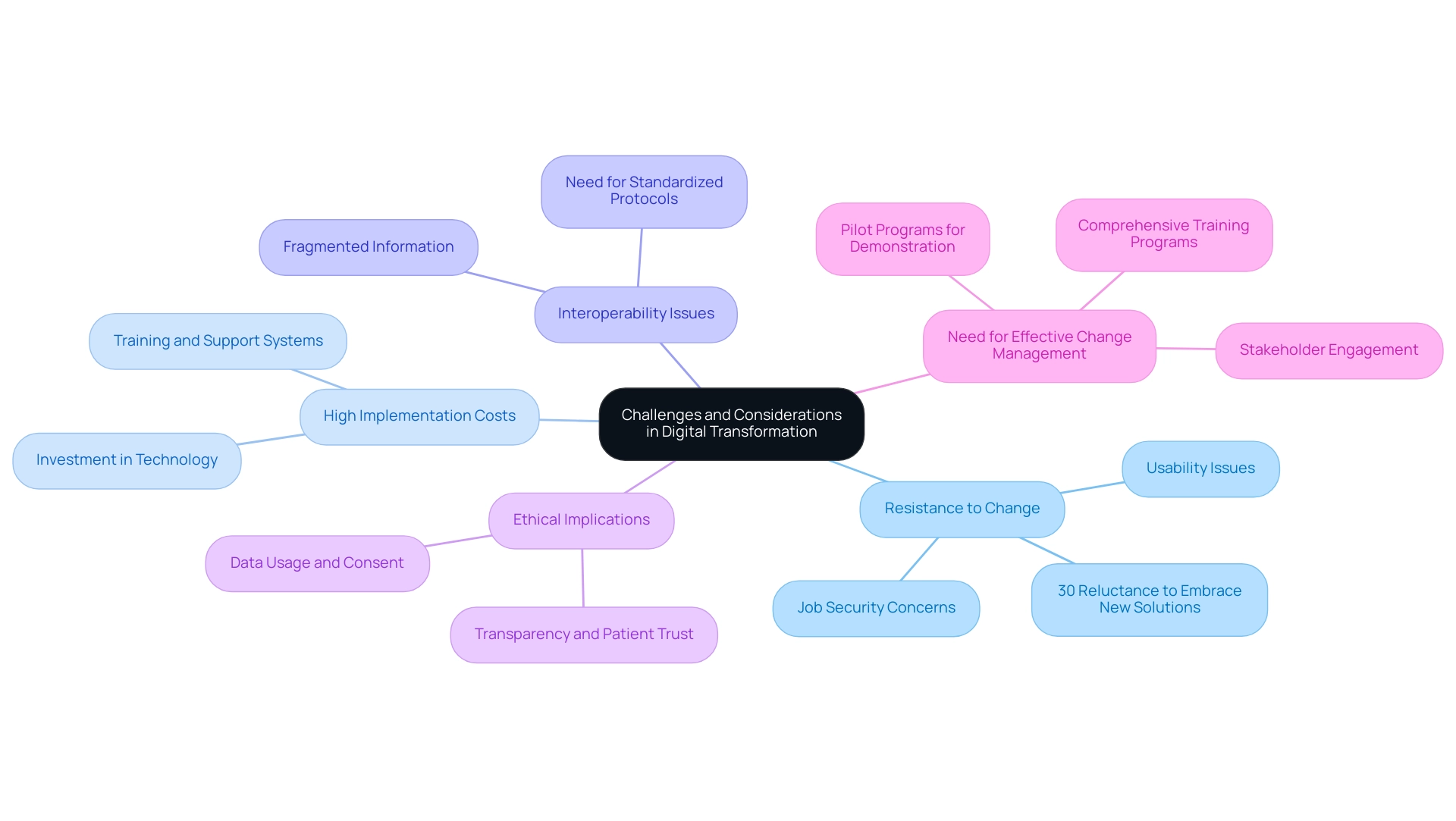
Future Trends in Digital Transformation in Healthcare
The future of digital transformation in healthcare is poised for remarkable advancements. A significant trend is the increasing adoption of artificial intelligence (AI) for predictive analytics, empowering healthcare providers to anticipate individual needs and optimize resource allocation. This proactive approach not only enhances patient outcomes but also illustrates the benefits of digital transformation in healthcare by streamlining operational efficiency.
Almost 72% of health system leaders recognize the advantages of digital transformation in healthcare, emphasizing the importance of investing in platforms that support technological tools and signaling a collective shift towards technology-driven care. Avato’s hybrid integration platform exemplifies this transition by addressing the challenges of integrating isolated legacy systems and fragmented information, thereby enhancing operational capabilities and reducing costs.
In 2025, the integration of wearable technologies is expected to revolutionize continuous health monitoring, showcasing the benefits of digital transformation in healthcare through real-time information collection and personalized health insights. This shift towards patient-centered care is crucial, ensuring that high-quality care remains a priority throughout the digital transformation journey.
Furthermore, the expansion of telehealth services is anticipated to highlight the benefits of digital transformation in healthcare by providing greater access to medical services, particularly in underserved areas. This trend is complemented by the growing reliance on blockchain technology, which promises to enhance data security and interoperability among medical systems, fostering trust and collaboration.
As organizations navigate these changes, staying informed about the benefits of digital transformation in healthcare, including the impact of AI and wearable technologies on medical delivery, will be essential. The successful implementation of these innovations can underscore the advantages of digital transformation in healthcare, as evidenced by the University of Louisville’s new standardized process, which saved an estimated $54,900 in diagnostic costs. In summary, the convergence of AI, predictive analytics, and emerging technologies, alongside Avato’s dedicated hybrid integration platform, will empower healthcare organizations to deliver more personalized and efficient care. By simplifying disparate systems and enhancing business value, Avato positions these organizations to thrive in an ever-evolving landscape.
Get your copy now to explore how Avato can support your digital transformation journey. Avato began with a group of enterprise architects who recognized a better way to integrate disparate systems and data, showcasing a deep commitment to architecting the technology foundation required to power rich, connected customer experiences. This dedication is vital for banking IT managers striving to future-proof their operations.
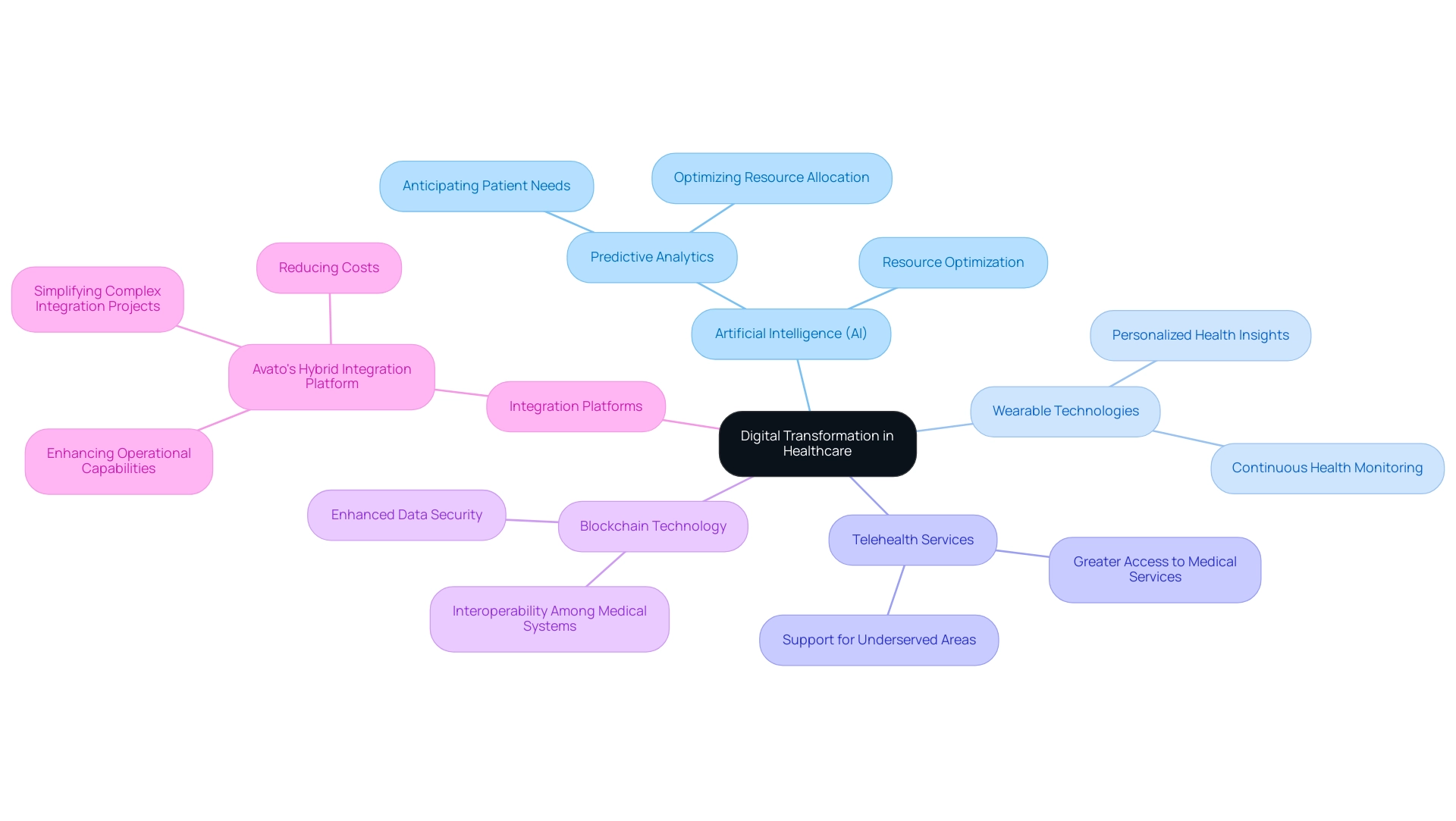
Conclusion
Digital transformation in healthcare is not merely a trend; it represents a fundamental shift that is reshaping the delivery and experience of care. By embracing advanced technologies such as artificial intelligence, telemedicine, and data analytics, healthcare organizations are enhancing patient outcomes while streamlining operations. The integration of these digital solutions is paving the way for a more efficient, patient-centered system that adeptly responds to the evolving needs of consumers.
However, this transformation brings significant challenges, including data security concerns and resistance from staff. As highlighted throughout the article, overcoming these hurdles is crucial for successful implementation. Organizations must prioritize robust cybersecurity measures and cultivate a culture that embraces change to ensure that digital tools are effectively integrated into everyday practices.
Looking ahead, the future of healthcare will increasingly be driven by technology, with predictive analytics and wearable devices playing pivotal roles in personalizing care and improving access. As healthcare providers navigate this digital landscape, partnerships with innovative platforms like Avato can facilitate the integration of disparate systems, ultimately enhancing operational efficiency and patient satisfaction.
In conclusion, the commitment to digital transformation in healthcare is essential for organizations aiming to thrive in this rapidly changing environment. By leveraging technology strategically and addressing the inherent challenges, healthcare providers can create a more responsive, equitable, and effective healthcare system that prioritizes patient care and outcomes. The time to embrace this digital future is now, and the benefits are poised to be transformative.

